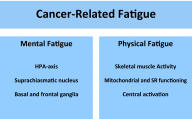Aiming for a better understanding and management of cancer-related fatigue
- PMID: 24037979
- PMCID: PMC3805156
- DOI: 10.1634/theoncologist.2013-0076
Aiming for a better understanding and management of cancer-related fatigue
Abstract
Cancer-related fatigue (CRF) is a serious symptom of patients with cancer and deteriorates their daily quality of life. Whereas fatigue is a common problem in the general population, with a prevalence of about 30%, up to 99% of patients with cancer have fatigue of more intense severity. CRF is directly related to the biology of cancer, but it can also be caused by anticancer treatment. We reviewed current evidence about the potential pathophysiological mechanisms causing CRF. Clinical methods to determine the presence and severity of CRF and potential treatment options to reduce CRF will be discussed. After reading this review, the reader will have knowledge of the current understanding of CRF and will be able to give evidence-based advice to patients with CRF.
Keywords: Drug therapy; Fatigue; Methylphenidate; Modafinil; Neoplasms; Questionnaires.
Conflict of interest statement
Disclosures of potential conflicts of interest may be found at the end of this article.
Figures



References
-
- Peuckmann-Post V, Elsner F, Krumm N, et al. Pharmacological treatments for fatigue associated with palliative care. Cochrane Database Syst Rev. 2010;11:CD006788. - PubMed
-
- National Comprehensive Cancer Network. Clinical Practice Guidelines in Oncology. Cancer Related Fatigue version 1.2013. [Accessed February 21, 2013]. Available at: http://www.nccn.org.
-
- Cella D, Davis K, Breitbart W, et al. Cancer-related fatigue: Prevalence of proposed diagnostic criteria in a United States sample of cancer survivors. J Clin Oncol. 2001;19:3385–3391. - PubMed
-
- Cella DF, Peterman A, Passik S, et al. Progress toward guidelines for the management of fatigue. Oncology. 1998;62:369–377. - PubMed
Publication types
MeSH terms
LinkOut - more resources
Full Text Sources
Other Literature Sources
Medical

